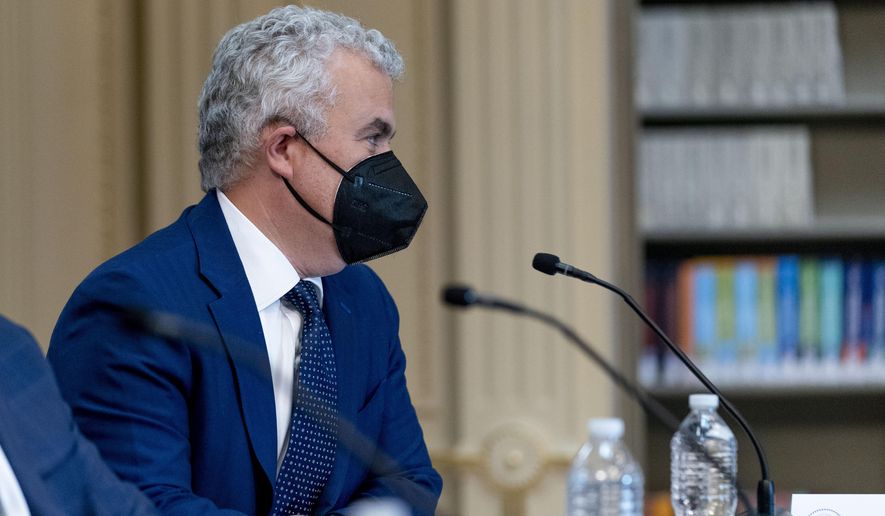The Biden administration said Wednesday it has appointed a new COVID-19 testing coordinator and is considering ways to procure better-performing masks as President Biden scrambles to catch up with the omicron wave and meet demand for diagnostics and other safeguards in schools, workplaces and households.
White House COVID-19 coordinator Jeff Zients said Tom Inglesby, an infectious diseases expert at Johns Hopkins University, is a leading expert who will help Americans screen themselves for the virus.
“We continue to work across multiple fronts to increase Americans’ access to testing and we’re all very, very grateful for his willingness, Tom’s willingness, to lead these efforts,” Mr. Zients said.
He announced the addition hours after the White House said it will send an additional 10 million tests per month — 5 million rapid tests and 5 million lab tests — to K-12 schools to help them stay open for in-person learning and allow students to “test to stay” after exposure.
“The omicron variant is driving unprecedented demand for testing. So we need to ensure school leaders have the support they need to meet that demand,” Mr. Zients said. “These 10 million additional tests available each month will allow schools to double the volume of the testing they were performing in November. The president is clear that the nation’s schools can and should be open and we have given state and local leaders the resources to ensure they can be open.”
Mr. Zients also said the government is looking at ways to make N95-grade and other high-performing masks available to more Americans but did not provide more details.
“Right now we’re strongly considering options to make more high-quality masks available to all Americans and we’ll continue to follow the science here,” he said.
Some members of Congress said they are tired of waiting.
Sen. Bernard Sanders, Vermont independent, introduced a bill Wednesday that instructs the government to send a package of N95 masks to every person in the country, including the homeless, prison inmates, students and persons in assisted-living facilities.
“As we face the rapidly spreading omicron variant, we should remember that not all face masks are created equal,” Mr. Sanders said. “Congress must demand the mass production and distribution of N95 masks, one of the most effective ways to stop the spread of the COVID virus. It is an absolute scandal that in the richest country in the history of the world, high-quality masks are not more readily available to frontline workers, health care workers, and all Americans.”
Mr. Sanders said 15 Democratic senators and dozens of House members support the idea.
Dr. Rochelle Walensky, director of the Centers for Disease Control and Prevention, also said the CDC is working on an update to its mask guidance so that Americans have a better understanding of what kind of protection they receive from each type.
She said any mask is better than no mask, and it’s important that people choose one they are willing to wear consistently.
“We want to provide Americans the best and most updated information to choose what mask is going to be right for them,” Dr. Walensky said.
The White House team announced the measures one day after federal disease officials faced a bruising grilling from senators who said the administration wasted critical test-production time during a lull in viral transmission in mid-2021.
Lawmakers said the administration was caught flat-footed by the omicron variant, which is blanketing the country but appears to be less severe in terms of bad outcomes than the delta variant that swept the country last summer.
Dr. Walensky highlighted a study by Kaiser Permanente Southern California that looked at tens of thousands of cases and found people with omicron were 53% less likely to be hospitalized with symptomatic COVID-19 than those with delta, 74% less likely to end up in the ICU and 91% less likely to die.
Still, Dr. Walensky said COVID-19 deaths are averaging 1,600 per day, an increase of 40% over the previous week. She suspects some of those deaths are remnants of the delta wave, even though omicron accounts for nearly all new sequenced virus samples.
She also pointed to the sheer number of people being infected by omicron.
“The sudden and steep rise in cases due to omicron is resulting in unprecedented daily case counts, sickness, absenteeism, and strains on our healthcare system,” she said. “The risk of hospitalization remains low especially among people who are up to date on their COVID vaccines. However, the staggering rise in cases over 1 million new cases each day has led to a high number of total hospitalizations.”
Mr. Zients defended the administration’s work to procure a diverse portfolio of drugs for COVID-19 after Republican senators said therapies were sidelined in favor of the vaccine push.
He said they secured 20 million treatment courses of Pfizer’s antiviral pill, the first 10 million of which will be available through June.
And he said the U.S. secured another 600,000 courses of a monoclonal antibody treatment from GlaxoSmithKline that’s been shown to be effective against omicron, meaning 1 million courses will be available through March.
Mr. Zients said the U.S. also will have 1 million courses, through March, of AstraZeneca’s preventive COVID-19 treatment for immunocompromised people who don’t benefit from vaccines.
“Bottom line, we’ve acted aggressively to support and secure a diverse portfolio of COVID treatments,” Mr. Zients said. “And as a result, our nation’s medicine cabinet has never been more stocked.”
For more information, visit The Washington Times COVID-19 resource page.
• Tom Howell Jr. can be reached at thowell@washingtontimes.com.




Please read our comment policy before commenting.